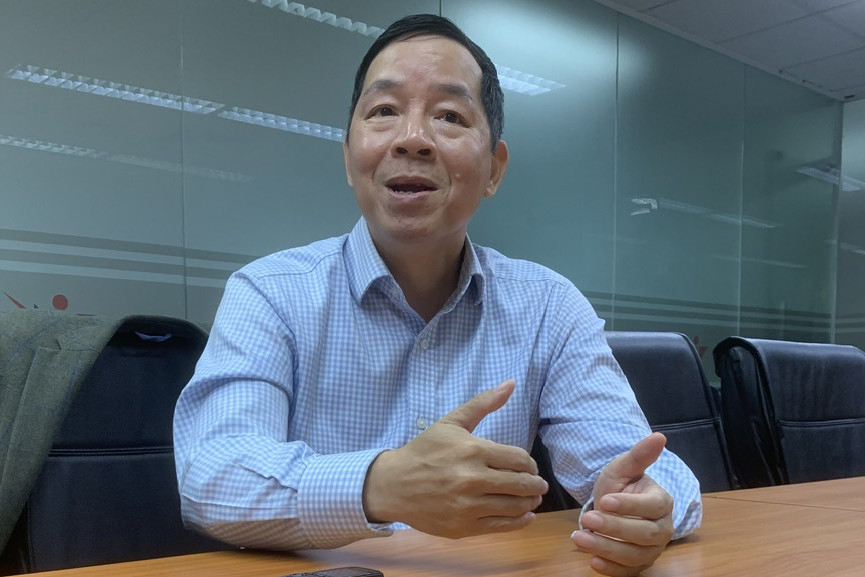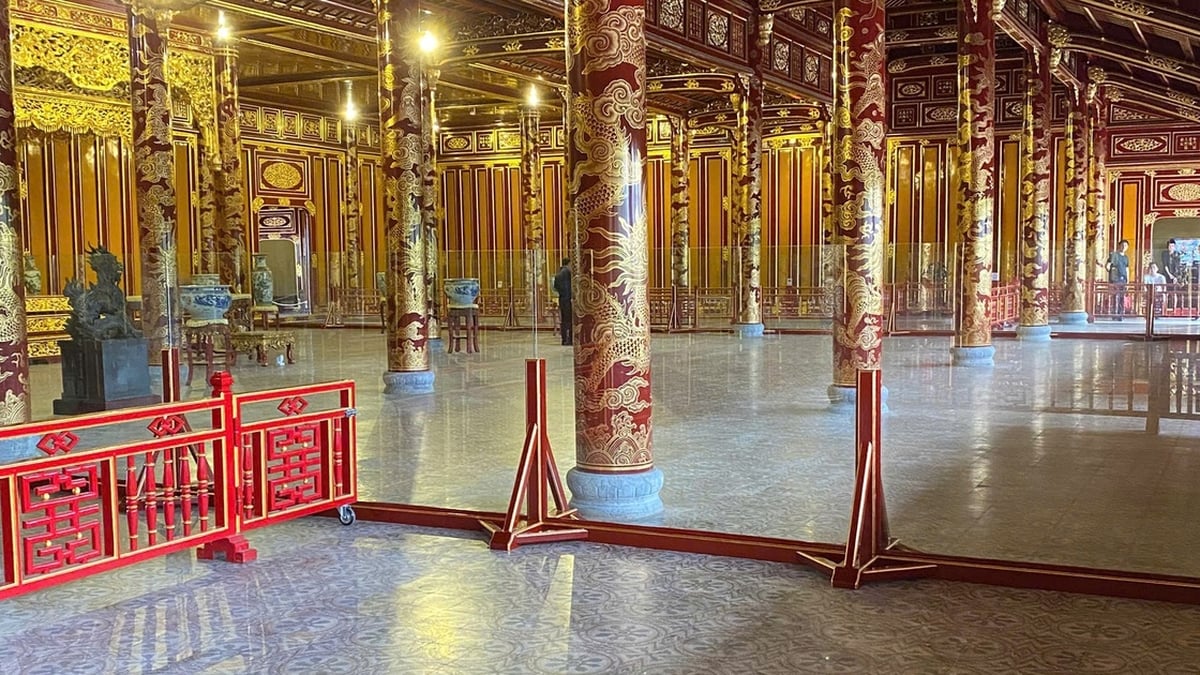Vietnam Weekly introduces the second part of the discussion with Dr. Vu Thanh Tu Anh, Senior Lecturer, Fulbright School of Public Policy and Management, Fulbright University Vietnam.
How do you comment on the target of continuous double-digit growth for the next two decades?
Mr. Vu Thanh Tu Anh : First of all, this goal is a necessary pressure that leaders put forth to push the system to strive.
Overseas, Japan, South Korea, Singapore and more recently China have all grown by double digits over long periods to become upper-middle-income countries.
Meanwhile, Vietnam has never achieved a growth rate of 10% in nearly 40 years after Doi Moi. The highest growth rate was in 1995 at 9.5% and then only decreased, decreasing by one percentage point each decade.
Vietnam is studying a plan for the next 5 years with a high growth target of 7.55 - 8%, or even higher. Assuming we manage to reach the target of 8%, it is still more modest than the countries I just mentioned, but it is also a step back from the long-standing growth trajectory.

Mr. Vu Thanh Tu Anh: To achieve growth of 8% and more, there is no other way but to promote exports because domestic demand is too low. Photo: VietNamNet
What does growth depend on? The answer is that Vietnam's economy depends on three pillars: exports, investment and consumption.
Household consumption has been growing slowly since the Covid period. We calculate that household consumption minus inflation has only increased by about 5-5.5%, half of what it was before. Household consumption accounts for more than 60% of total GDP, and with such a growth rate, it is clearly difficult to reach the target of 8% growth, not to mention the aging population.
In terms of investment, Vietnam is attracting a lot of FDI capital from the current geopolitical situation. However, we must anticipate that if tomorrow Vietnam is designated as a transit point for Chinese goods, that advantage will immediately end. That means the opportunity is huge but the risks are also huge.
So we need to manage risks to optimize opportunities. That's a huge problem that I haven't seen discussed.
Another issue is exports. We were once listed as a currency manipulator when our trade surplus was the 5th largest and now it is the 3rd largest. China's trade surplus is about 200 billion dollars, Mexico's is about 150 billion dollars and Vietnam's is about 104 billion dollars.
To grow 8% or more, there is no other way but to boost exports because domestic demand is too low. Then we can move up to second place. Then the risk appears…
So, have such contradictions and domestic aspirations in relation to international politics been thoroughly calculated? If we cannot control these risks, a lot of our hard work will go down the drain.
The country's endogenous capacity
Sir, recently there has been a view that the private business sector should become the most important driving force to boost the economy. What is your view on this view?
Mr. Vu Thanh Tu Anh : First of all, we need to look at why the officially registered private business sector only accounts for 10% of GDP.
Where does the country’s endogenous capacity lie? Obviously it lies in the private enterprise sector. Yet this sector is still weak. That is what worries me. Our core capacity, our deep-rooted, enduring values that provide a lasting belief in the vitality of the nation, are weak.
That said, Vietnam still has many opportunities for development. The country's policy focus must be on promoting businesses, especially small and medium enterprises.
However, up to this point, policymakers have been incoherent.
For example, the 2017 Law on Support for Small and Medium Enterprises lumps businesses of different sizes into one basket. This is convenient in terms of law, but in terms of policy, it is impossible to separate two very different roles in the business ecosystem.
For example, most businesses are super small, a business with only 10-15 employees, how can they innovate, be creative, how can they connect with Samsung and Intel? They have no chance.
Micro-enterprises help ensure employment and social security. They are linked to the local economy, and can provide what the local needs.
But for medium-sized enterprises, their problem is completely different from that of micro-enterprises. They have many employees, they are in a position to connect with global corporations.
But if the policy is the same for everyone, how can small businesses connect? How can a basket boat with more than 10 people cling to a big boat to go out to the ocean!

Vietnam has no other choice but to promote the private enterprise sector by improving management and governance in the coming New Era. Photo: Le Anh Dung
Small and micro enterprises need to connect with large enterprises and from there they grow and move up the value chain. This is the path of most conglomerates in Taiwan. We should learn from Taiwan in this aspect, not from South Korea, where the chaebols are developed.
The next important issue is that the relationship between the state and enterprises must change. This was said by the Prime Minister 's Advisory Group more than 20 years ago.
Now, policymakers themselves must immerse themselves in understanding businesses.
However, they must maintain their autonomy and not become hostages or be manipulated. Singapore has a very good compensation policy so that civil servants do not want to be corrupt, cannot be corrupt, do not dare to be corrupt... Their civil servants have a very high position in society and they have pride in what they are doing.
Meanwhile, Vietnamese civil servants have meager salaries and no benefits, but they manage and have too much power over a huge amount of assets. So is it asking and giving, an abuse of power? It is time for salary reform.
So what do you think is the driving force for growth now?
Mr. Vu Thanh Tu Anh : In the short term, Vietnam still has to rely on FDI along with exports, plus investment from the state sector. In the context of opportunities coming and then closing quickly, it means that we cannot wait for private enterprises to grow rapidly within the next five years.
Therefore, Vietnam still has to rely on FDI and exports. I would also like to add that we have nurtured and pampered this sector over the past few decades despite the fact that they play a very modest role in terms of creating added value and creating jobs in the economy.
In the medium term, we must certainly rely on the private sector because this sector cannot grow immediately to generate growth.
Unfortunately, the domestic business sector is being neglected. I think we are doing something very wrong, we are abandoning our own martial arts. I often say that state-owned enterprises are “natural children”, FDI enterprises are “adopted children”, and private enterprises are “stepchildren”.
Vietnam has no other choice but to promote the private business sector by improving management and governance in the coming New Era. Why did the General Secretary have to direct: Resolutely abandon the mindset of if you can't manage, then ban it?
Because for a long time, they have been shackled, they have been forced to wear weights. Now, the State must improve its administrative capacity, and at the same time release the energy of the private sector, then the door to independence and autonomy will open for the country.
In short, we must truly reform the business environment, considering institutional breakthroughs as the breakthrough of breakthroughs.
Besides, it is necessary to improve the capacity and skills of Vietnamese people. I talked to many chip design companies, they confirmed that they have to retrain everyone. These businesses need a lot of brains, a lot of capable engineers to implement high technology, but cannot find people.
Furthermore, the higher the technology, the greater the need for intellectual property protection. This is also a point that Vietnam needs to pay attention to.
Looking back at the sluggish development of the private business sector, we see that property rights are still very weak, intellectual property rights are not respected… when businessmen get into trouble with the law, the whole business is in trouble and bankrupt. How can we handle this problem so that they can develop to their full potential?
Mr. Vu Thanh Tu Anh : In 2008, our group published the book “Choosing Success”, which describes East Asian and Southeast Asian countries. Vietnam is located in the middle, if we turn left we will go to East Asia, and if we turn right we will go to Southeast Asia.
In East Asia, Japan and South Korea have developed remarkably. Samsung’s CEO has such a problem but the whole group still operates well. Meanwhile, if businessmen in the Philippines, Indonesia, Thailand or Vietnam are in a similar situation, it will be difficult for their businesses to operate, right? This consequence is related to the institutions, the thinking of leaders, of society… like a curse of Southeast Asia. Southeast Asian countries in general have fallen into this trap, not just Vietnam.
Now what to choose is the problem because we really have to choose a system that suits our national identity.
Because if it is purely transplanted, it will not adapt and will not survive. However, to create a system that is still consistent with the identity according to international practice is a big challenge. That is institutional reform.
Looking at Vietnamese businesses, most private businesses tend to break up when they grow up. Why do they have this motivation? I think one of the important reasons is that the businesses themselves have a short-term vision and do not dare to develop long-term. But this cannot be blamed on them.
Because the business environment is risky and can change at any time. If they do everything for the long term, they will not survive. Therefore, we must create a stable and safe policy environment. If we do not create a sense of security for businesses, they will take the hit. Each institution has its own business.
In a risky business environment, their optimal response is like that. Therefore, in the end, they still have to go back to reforming the business environment.
In terms of law, the legal system must be transparent, fair, clear and most importantly, enforced. In many cases, our country's laws are like that but when enforced, they are not fair, for example between business sectors as I mentioned.
A business environment where businesses feel safe and can invest long-term is crucial.
It is time to remove all barriers for private enterprises to do business and develop. This is the most important thing, the country's internal strength in the context of a very complicated world, increasingly fierce competition, terrible climate change, the consequences of which have been accumulating and suppressing for a long time.
Dr. Vu Thanh Tu Anh: This reform of the apparatus is worth cheering because it was implemented very drastically, quickly and created broad support from society. This wave shows that General Secretary To Lam is a reformer.
He showed himself to be a nation-builder and builder. He truly became the representative of the strongest voices of reform and at the same time the one who carried out those reforms most strongly and resolutely.
I believe that this institutional reform will create social trust so that society can be given new vitality and the excitement that we had when we joined the WTO. That is a good thing for Vietnam.
Vietnamnet.vn
Source: https://vietnamnet.vn/khong-con-cua-nao-khac-la-thuc-day-doanh-nghiep-tu-nhan-2369360.html





























































































![[Infographic] In 2025, 47 products will achieve national OCOP](https://vphoto.vietnam.vn/thumb/402x226/vietnam/resource/IMAGE/2025/7/16/5d672398b0744db3ab920e05db8e5b7d)





Comment (0)